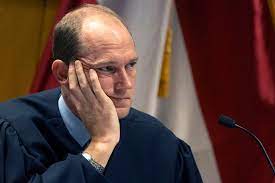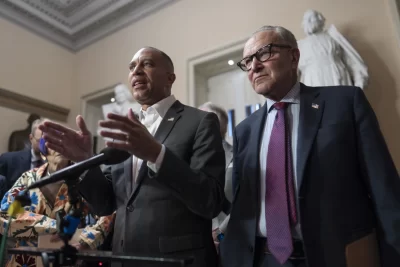
A judge in Atlanta is set to hear arguments Tuesday on a request to revoke the bond of one of former President Donald Trump’s co-defendants in the Georgia case related to efforts to overturn the 2020 election.
Fulton County District Attorney Fani Willis last week filed a motion asking county Superior Court Judge Scott McAfee to revoke the bond of Harrison Floyd. She wrote in her motion that Floyd has been attempting to intimidate and contact likely witnesses and his co-defendants in violation of the terms of his release.
Floyd’s attorneys wrote in a court filing that Willis’ allegations are without merit and that the motion is a “retaliatory measure” against their client. Floyd “neither threatened or intimidated anyone and certainly did not communicate with a witness or co-defendant directly or indirectly,” they wrote.
McAfee set a hearing on Willis’ motion for Tuesday afternoon.
The charges against Floyd relate to allegations of harassment toward Ruby Freeman, a Fulton County election worker who had been falsely accused of election fraud by Trump and his supporters. Floyd took part in a Jan. 4, 2021, conversation in which Freeman was told she “needed protection” and was pressured to lie and say she had participated in election fraud, the indictment says.
Four defendants have pleaded guilty after reaching a deal with prosecutors that includes a promise to testify in any trials in the case. Trump and the others have pleaded not guilty. No trial date has been set, but Willis last week asked McAfee to set it for Aug. 5, 2024.
Floyd was the only defendant in the case who spent time in jail after his indictment because he’s the only one who didn’t have a lawyer reach an agreement on bond conditions before he turned himself in at the Fulton County Jail. The conditions of his release include not communicating directly or indirectly about the facts of the case with any of his co-defendants or any known witnesses.
In her motion to revoke Floyd’s bond, Willis cited numerous posts Floyd had made on social media in the previous weeks. They included repeated attacks on Georgia Secretary of State Brad Raffensperger and numerous mentions of Freeman, both likely witnesses in the case. In a post on X, formerly known as Twitter, he also accused attorney Jenna Ellis, a co-defendant who pleaded guilty last month, of lying.
Willis called these and other posts “intentional and flagrant violations” of his bond conditions.
Floyd’s attorneys noted that while Trump’s bond order specifically mentions the use of social media as part of his bond conditions, Floyd’s does not. They included examples of social media posts that Trump made about his White House chief of staff Mark Meadows, a co-defendant, and about attorney Sidney Powell, who pleaded guilty in the case.
“A review of President Trump’s social media posts make the decision to go after Harrison Floyd hard to justify,” they wrote.
They argue that attempting to “indirectly communicate” with anyone by tagging them on social media is analogous to shouting to someone across a crowded stadium. They also argued that Floyd wouldn’t attack Freeman because he views her as a favorable witness for his defense.
They said that Floyd’s posts are political speech protected by the First Amendment and that Willis is retaliating against him for rejecting a plea offer and subpoenaing Fulton County election records, among other things.







